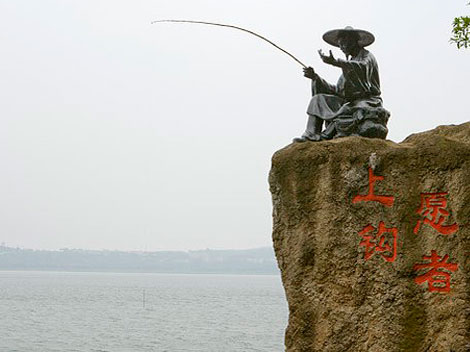
Legends: Jiang Taigong Fishes

The last ruler of the Shang dynasty (16th - 11th century BC) was a tyrannical and decadent slave owner who spent his days reveling with his favorite concubine, Daji. He mercilessly executed or punished upright officials and anyone who opposed him. Jiang Shang, who had once served the Shang king, harbored a deep hatred for him. A military expert, he longed for the day when someone would call upon him to help overthrow the king. He waited patiently, fishing in a tributary of the Weihe River (near present-day Xi'an) with a barbless hook or sometimes no hook at all, believing the fish would come to him when they were ready.
King Wen of the Zhou state, located in central Shaanxi, discovered Jiang Shang while he was fishing. Following the advice of his father and grandfather, King Wen was on the lookout for talented individuals. His grandfather, the Grand Duke of Zhou, had foretold that a sage would one day emerge to assist in ruling the Zhou state.
Upon encountering Jiang Shang, King Wen sensed that he was an extraordinary old man and struck up a conversation. He soon realized that this white-haired fisherman was not only insightful but also a skilled political thinker and military strategist. Believing that Jiang Shang could be the sage his grandfather had predicted, King Wen invited him to court, appointed him as prime minister, and bestowed upon him the title of Jiang Taigongwang (Hope of the Duke of Zhou), which was later shortened to Jiang Taigong.
A later account of Jiang Taigong’s life states that he believed a country could only flourish if its people prospered. He argued that if officials enriched themselves while the populace remained poor, the ruler's reign would be short-lived. The primary principle of governance should be to care for the people, which meant reducing taxes and labor burdens. By adhering to these principles, King Wen is said to have rapidly strengthened the Zhou state.
After King Wen's death, his son King Wu ascended to the throne and planned to send troops to overthrow the Shang king. However, Jiang Taigong advised caution, saying, "While I was fishing at Panxi, I learned an important truth: to succeed, one must be patient. We need to wait for the right opportunity to eliminate the King of Shang." Soon, word spread that the people of Shang were so oppressed that no one dared to speak out. Seeing this as the right moment to act, King Wu and Jiang Taigong decided to launch an attack, as the people had lost faith in their ruler. A fierce battle ensued at Muye, located 35 kilometers from the Shang capital Yin (modern-day Anyang in Henan Province).
Leading the charge, Jiang Taigong beat the battle drums and, with 100 of his men, drew the Shang troops southwest. Meanwhile, King Wu’s forces quickly surrounded the capital. The Shang king had sent relatively untrained slaves to fight, and many of them either surrendered or revolted, allowing the Zhou forces to capture the capital.
The Shang king set fire to his palace and perished in the flames, while King Wu and his successors established the Zhou dynasty's rule over all of China. As for Daji, one version of the story claims she was captured and executed, while another suggests she took her own life. Jiang Taigong was appointed duke of the State of Qi (in present-day Shandong province), where he oversaw improvements in communication and the exploitation of fish and salt resources, leading to the state's prosperity.